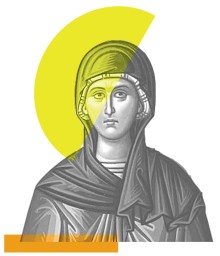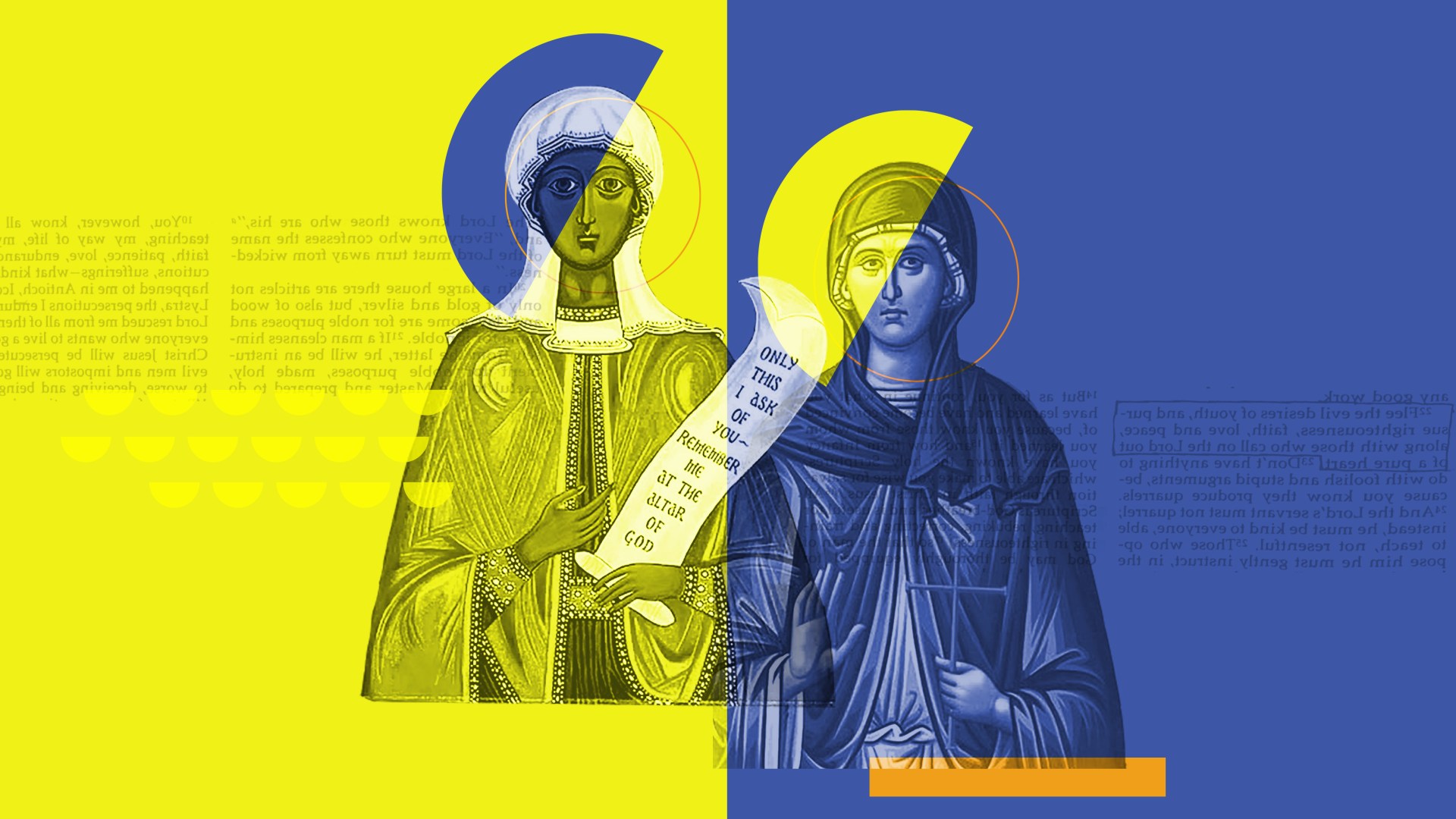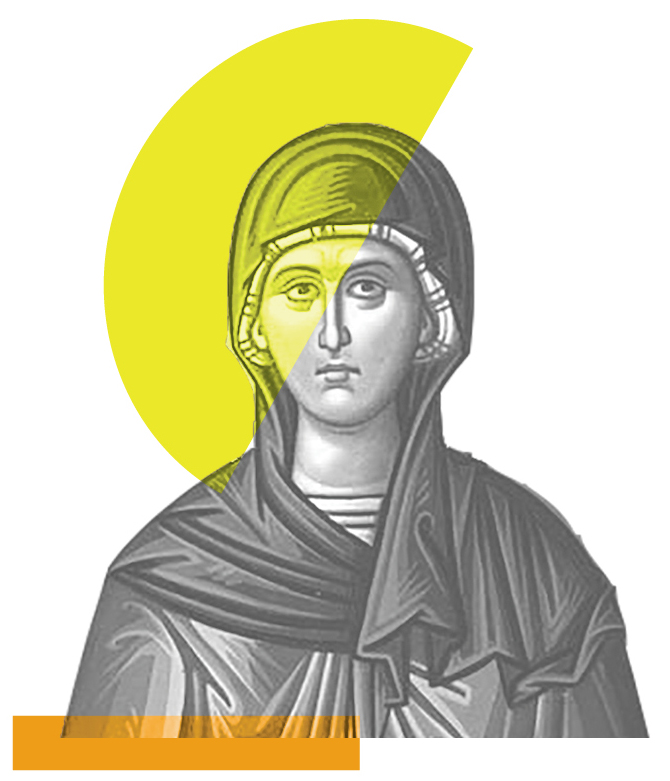“What are you doing? In those books which you read, have I ever heard that women were introduced into this kind of disputation?” This almost awkwardly direct question comes from Augustine’s mother, Monica, when she finds out he is recording her comments for his book On Order. She is not so much honored as dismayed by the censure her inclusion may bring him. In response, Augustine concedes that some may dismiss him for including the voice of a woman in his writings. But he doesn’t give a whit for such critics, he says; such “proud and ignorant men” should attend more to the substance and less to the “dress” of what they read.
Though he expects some superficially minded people will look down on him for including a woman’s ideas, Augustine incorporates Monica’s contributions because her ideas are so good. He wants her to be a part of the discussion because her spiritual inclinations and intellectual chops make her indispensable. He writes of his mother, “By long intimacy and diligent attention I had by this time discerned her acumen and burning desire for things divine … her mind had been revealed to me as so rare that nothing seemed more adapted for true philosophy. Accordingly, I had determined to do my best that she be not absent from our conversation.” And so, through Augustine’s account, we gain a precious glimpse of this brilliant mother of the church.
Of the few early Christian women commonly known today, Monica, along with her near-contemporary Macrina, are perhaps the most familiar. But despite the records we have of their extraordinary spiritual and intellectual gifts, they are not commonly known for their own abilities. Instead, these fourth-century mothers of the church are famous by association. Monica’s prodigal son, Augustine, became the father of the Western church. Gregory of Nyssa and Basil, Macrina’s younger brothers, have been long known with their friend Gregory of Nazianzus as the Cappadocian Fathers. These men who made Monica and Macrina famous shaped the theological imagination of the entire Christian tradition, giving classic formulation to doctrines we now consider basic: the Trinity, grace, and the Holy Spirit.
Like Eunice to Timothy and Miriam to Moses, Monica and Macrina are great women of the faith who enabled the ministries of great men. Submission to the spiritual leadership, teaching, and admonition of Monica and Macrina, which continued well into the adulthood of both Augustine and Gregory, made these church fathers the giants they were.
But what can we say about Monica and Macrina as faithful biblical interpreters in their own rights? In both cases, a lesser-known yet foundational aspect of their legacy, as depicted in the texts that come down to us, is their own work as students and teachers of God’s Word.
Monica: Hearing and Speaking the Word

Augustine characterizes his mother as a woman who prized and pursued Scripture in her everyday life. In a comic interlude in his early philosophical dialogue On Order, he recounts how one of his pupils had recently learned a chant of Psalm 80:19. The young man just couldn’t stop singing it. He sang it in the morning; he repeated it all day long. He even kept singing it, as Augustine put it delicately, when he had “gone out for the needs of nature.” At this, Monica put her foot down, Augustine tells us, “precisely because the place was unbecoming for chant.” The young man rejoined, “jestingly: ‘As if, should some enemy confine me here, God would not hear my voice!’ ” To our modern sensibilities, Monica’s reproof may seem prim, even prudish. But this little anecdote, meant to amuse, makes a lighthearted gesture toward the enormous weight Monica accords to Scripture. She wants worship and the Bible to have a place of honor in the lives of those around her.
In addition to respecting Scripture, Monica hungered for it. Augustine, addressing God in Confessions, tells us of Monica’s eagerness to hear God’s Word: “taking no part in vain gossip and old wives’ chatter, [she wanted] to hear you in your words and to speak to you in her prayers.” Monica confided her deepest hopes and longings to her Maker, pouring out her tears before him as she prayed daily, year in and year out, for the salvation of her son. But she also wanted to listen to God on his own terms.
Monica heard God’s Word through regular Christian worship, attending church twice a day. The Word preached by her well-known pastor, Ambrose, riveted her, and she “would zealously run to Church to hang on [his] lips, to ‘the fount of water bubbling up to eternal life’ (John 4:14).” Given her social status, it is also likely that Monica, unlike many women in the ancient world, was literate and was able to follow up on messages she had heard in church with reading at home. Monica’s engagement with the Word in worship was frequent, consistent, and life-sustaining.
Monica’s attentive listening to Scripture equipped her to speak the truth of God’s Word into the life of her beloved son Augustine. He recounts how imbibing the name of Christ along with his mother’s milk whetted a deep subconscious appetite for the Word. Though when he first read the Bible for himself he found it primitive, its pull was elemental. In the end, Augustine could not resist it. When her son reached adolescence, Monica again proved to be the vehicle of God’s Word. Seeing him consumed by the heat of his teenage lusts, she tried to restrain him. At the time, Augustine dismissed her advice as “womanish.” But he later came to see that her admonitions were the very voice of God. Looking back ruefully, he prayed, “I believed you were silent, and that it was only she who was speaking, when you were speaking to me through her.”
Monica continued to speak God’s Word into the life of Augustine in his adulthood, as recorded in another early dialogue, The Happy Life. At the end, Augustine suggests that the happy life is knowing the triune God. On cue, Monica concludes with an allusion to 1 Corinthians 13:13: “This is without doubt the happy life, and that life is perfect toward which we can, we must presume, be quickly brought through solid faith, lively hope, and burning love.”
Now an adult and a committed Christian himself, Augustine gratefully receives these biblically inspired words of Monica, letting them stand as the final statement of substance to the larger group of Christian men assembled for the conversation and to the many readers the work will have in his own generation and beyond.
Macrina: Scripture as the Starting Point

Just as Monica was a teacher taught by God for Augustine, Gregory of Nyssa refers repeatedly to his elder sister Macrina simply as “the teacher.” The dialogue On the Soul and the Resurrection, in which Gregory poses critical questions while Macrina defends the Christian faith, gives us a window into how Macrina used Scripture.
Born into a prosperous family, Macrina likely enjoyed a good education in addition to basic literacy. In On the Soul and the Resurrection, she brings her innate and learned intellectual capacities to bear with a sophistication and skill on par with her brothers and other thought leaders of the period. Indeed, such was her wisdom that her brothers constantly looked up to her.
The book begins with high emotion. Gregory has set out to visit his sister to convey the sad news of their brother Basil’s death. But when Gregory first lays eyes on Macrina, he is shocked to see that she herself is not long for this world. After giving Gregory time to express his sorrow, Macrina “reproached me with the apostolic saying, that we should not grieve concerning those who are asleep, because this emotion belongs only to those who have no hope.” These words from 1 Thessalonians 4:13 are Macrina’s first in the work. Her use of Scripture to intervene in a family crisis is just one of the many ways she draws on the Bible as a teacher of theology.
Macrina uses Scripture to set boundaries. In her words, “we always use the holy Scripture as the canon and rule of all our doctrine. So we must necessarily look towards this standard and accept only that which is congruent with the sense of the writings.”
Yet, as Macrina shows, these constraints make possible constructive and critical engagement with extra-biblical viewpoints. In the dialogue, she engages a wide variety of philosophical ideas, rejecting some and accepting others. The Bible is the benchmark that enables this differentiation.
Macrina lets Scripture show her where to direct her theological energy. She sees Paul as introducing a key distinction: “The apostle says that he has believed this much, that the age itself was fashioned by the divine will, and whatever has come to be within it … but the how he has left unexamined.” We can know that some things are true, because Scripture tells us so, without understanding how they are true. Macrina uses this distinction to avoid getting bogged down in insoluble intellectual puzzles so she can focus on the issues God has called and equipped her to address.
Macrina also draws on Scripture to inform belief’s content. She does so on the level of individual verses, determining, for example, on the basis of Genesis 1:28 that reason should control the emotions since human beings were, in her words, commanded “to rule over all the irrational creatures.” She also draws on the broader biblical narrative, for instance arguing based on various biblical exemplars (Daniel, Phinehas, Moses) that emotions are neither bad nor good in themselves but are up to us to use wisely. And like many other early Christian thinkers, Macrina uses Scripture to interpret Scripture. In a particularly beautiful passage, she weaves together a wide range of biblical metaphors to imagine what it might mean when Paul describes God as “all in all” (1 Cor. 15:28). Someday, she says, God will be our everything: “a place for the saints, a house, a garment, nourishment, drink, light, wealth, dominion, and every concept and name of the things which contribute to the good life for us. He who becomes all will also be in all.”
Finally, Macrina is serenely confident about the truth of Scripture. We can rest secure in what the Bible says without arguing for it at every turn. At one point, Gregory expresses concerns about those who reject the existence or creative power of God: If they don’t even accept the reality of God, how should we convince them of the Resurrection? Macrina’s answer: We shouldn’t even try. “She said, ‘It would be more fitting to keep silent concerning these matters, and not to consider the foolish and impious propositions worthy of an answer, especially since one of the divine sayings forbids us to answer the fool according to his folly [Prov. 26:4–5]. He is undoubtedly a fool who, in the words of the prophet, says that there is no God [Ps. 14:1].’ ” It is not that Macrina doesn’t care about such people. Her point is that Scripture liberates us to keep our peace in the face of their critiques; we need not be defensive.
Instead of forcing the Bible to fit objections it was never designed to address, Macrina begins with Scripture, letting it speak on its own terms: “I think that we should first run briefly through what is set forth in various places by the divine Scripture concerning this doctrine.” She then draws on a variety of passages to establish a solid basis for the Resurrection (Ps. 103; Ezek. 37:1–14; and 1 Cor. 15:51–53, in addition to the Gospels). Only after discussing biblical evidence in favor of it does she hear Gregory out on the objections. And even at that point, she emphasizes Scripture: “First we must understand what the aim is of the doctrine about the resurrection, why this is declared by the holy revelation, and why we believe it.” In offering her final assessment, Macrina does not mince words. “Truly we should recognize the superfluity and ineptitude of the objections, as we plumb the depths of the apostle’s wisdom.” We see the shallowness of these arguments, Macrina contends, by immersing ourselves in the profundity of Scripture.
Loving Scripture, Loving God
At one point in On the Soul and the Resurrection, Macrina draws on a text Monica had also invoked at the end of The Happy Life: 1 Corinthians 13. The purpose of human life, Macrina suggests, is an endless increase in love because God’s beauty is unlimited: “But when the thing hoped for comes, all the others grow quiet while the operation of love remains, not finding anything to take its place.”
For both Monica and Macrina, Scripture provides a script for everyday life: singing a Psalm of praise to God, raising a child, recognizing intellectual limits, learning from others while holding fast to the truth, grieving a loved one who is dying. But for both women, the Bible is more, in the end, than a practical how-to manual. It directs us to the stirring beauty of our Creator and the ultimate, glorious purpose of our lives that gives meaning to every minor concern: It teaches delight in God.
Han-luen Kantzer Komline teaches church history and theology at Western Theological Seminary in Holland, Michigan. She is the author of Augustine on the Will: A Theological Account.

This article is part of “Why Women Love the Bible,” CT’s special issue spotlighting women’s voices on the topic of Scripture engagement. You can download a free pdf of the issue or order print copies for yourself at MoreCT.com/special-issue.















